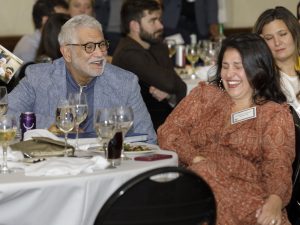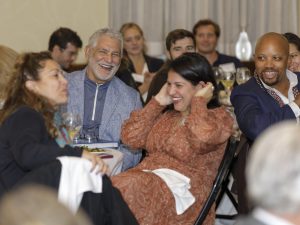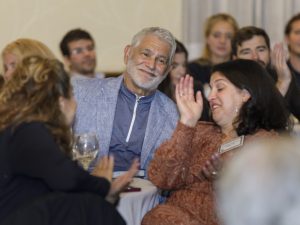Reflections on Coaching
A Bicentennial Essay by Paul Assaiante P’06, who retired in 2023 after three decades as Trinity College's head men's squash coach.
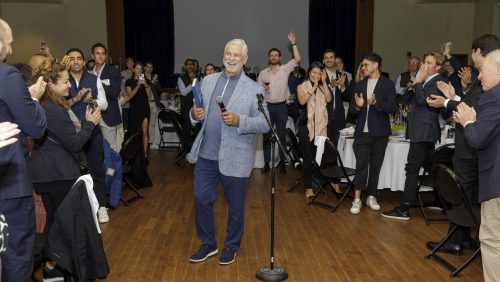
When I think about the lessons for Trinity College’s next century, I am reminded of one of my first memories as a professional. As a 21-year-old, I arrived as a new coach on the campus of West Point ready to take on what would become a 50-year career. Not sure of what to expect, I was struck by a plaque situated next to the athletic center. As clear as day, I can still see the words of military leader General Douglas MacArthur, a West Point graduate, speaking to me: “Upon the fields of friendly strife are sown the seeds that, upon other fields, on other days, will bear the fruits of victory.”
While I was not a military man, I took MacArthur’s words as a signal of purpose and of the importance of helping young people. Within the experience of friendly competition lie foundations for life. Through athletics, we can learn integrity and resilience. So long as we stay true to our own best efforts of fair competition—free of dishonest intentions—we learn lessons that carry us through more complicated battles and difficulties later in life. The squash courts are far from the fields that MacArthur eventually would travel, but their lessons can transcend place and time.
As a coach, my job is not to win per se but rather to elicit in young people a drive for self-awareness so that they may excel. While 17 championships (who’s counting?) might, for some, equate to the ultimate source of pride, good coaching is worth so much more than that. I am certain that my colleagues and fellow coaches would agree that simply watching our players grow and develop their own confidence and skills through discipline, focus, teamwork, and a sense of integrity generates the most significant pride of all. I believe that more learning occurs in the aftermath of defeat and that this is where coaches can find the greatest opportunities to teach.
We all can be coaches, and we all can be coached in one area of life or another. During my time at Trinity, I have loved what I have learned and have enjoyed coaching young people to cultivate their inherent talent and their bond as a team. I believe in the Japanese philosophy of “you cry in practice, laugh in competition.” Having followed this for more than 50 years, I would like to offer some thoughts to our community in a commitment to our collective future.
First, Bantams are small birds, but boy, are we mighty. Trinity couldn’t have a better 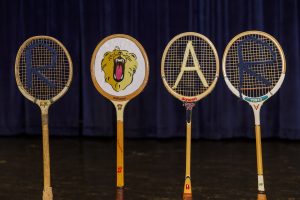 mascot. I have memories of our team driving in antiquated, rickety vans for long hours to far better resourced colleges. They had the expansive facilities, fancy uniforms and equipment, and staff size to prove it. Though Trinity’s endowment was smaller, we still arrived with a chip on our shoulder. We were there to compete, and, admittedly, it was thrilling when we won. This is why I think the current comprehensive campaign title of All In is so fitting. This is how we roll.
mascot. I have memories of our team driving in antiquated, rickety vans for long hours to far better resourced colleges. They had the expansive facilities, fancy uniforms and equipment, and staff size to prove it. Though Trinity’s endowment was smaller, we still arrived with a chip on our shoulder. We were there to compete, and, admittedly, it was thrilling when we won. This is why I think the current comprehensive campaign title of All In is so fitting. This is how we roll.
Second, the best coaches are present. Every student-athlete has their own language, their own way of thinking, and their own way of communicating. Our teams are truly diverse—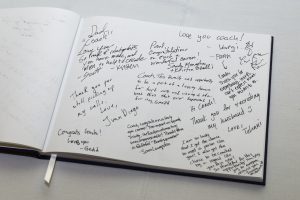 internationally, culturally, ethnically, physically, socioeconomically, religiously. One year, our team had players from 11 different countries. The best method of motivation is to listen, to observe, and to respond to each player as an individual human being. With racquet sports inherently individual by nature, the success of a team requires an acknowledgment of the value of each person’s inherent differences and similarities and the act of being available to every member.
internationally, culturally, ethnically, physically, socioeconomically, religiously. One year, our team had players from 11 different countries. The best method of motivation is to listen, to observe, and to respond to each player as an individual human being. With racquet sports inherently individual by nature, the success of a team requires an acknowledgment of the value of each person’s inherent differences and similarities and the act of being available to every member.
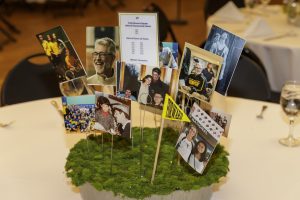 Third, going back to the Japanese philosophy, young people need constant challenges in their training. Practice should be hard to prepare them for the possibility of adverse conditions or failure. No person can be the star or win all the time, so resilience and perseverance are necessary traits to learn.
Third, going back to the Japanese philosophy, young people need constant challenges in their training. Practice should be hard to prepare them for the possibility of adverse conditions or failure. No person can be the star or win all the time, so resilience and perseverance are necessary traits to learn.
Fourth, being all in means a commitment to care. After a player has given their all, losing can hurt. It can destroy mindsets and focus. Our players are also scholars who balance the pressures of academic rigor and maintaining good grades. Sometimes they slip. Sometimes they have a psychological block. Sometimes concerns elsewhere occupy their earts and minds. Troubles in the world, such as conflicts in their homeland or social unrest, can take a toll on their psyche. I vividly recall just after 9/11, when then-president Ron Thomas, recognizing where some of the players called home, made a point to take our team aside to express care for their well-being. An act such as this reflects paying attention and listening. I have always maintained that creating a safe space for players means they can share anything. Being empathetic is not the same as coddling. My role is not to lecture or to provide all the answers but to allow players the time and space to talk and to be themselves when they need it.
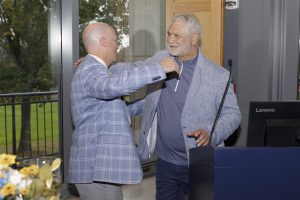
My last lesson is one that I cherish the most: losing is the best way to learn. Perhaps my proudest memory as a coach is from the 2012–13 national championship. Despite giving it our all and our tireless effort to reach and stay at the top, the mighty Bantams fell to Princeton in a crushing defeat. Our winning streak of 13 consecutive national championships and 252 consecutive wins had been interrupted. Tears flowed uncontrollably. The tidal wave of emotion that ranged from disappointment to agony shook the players as they hugged one another and cried. But it was through those tears that the team communicated universally in the same language their deep respect for one another and a love for the sport. When I look back at the entirety of my career, I can say unequivocally that this was my proudest moment. As captured in , failure drew us together. From our pain, we learned to never take our team’s integrity for granted. At that moment, I truly felt what it meant to be all in for one another and for Trinity.
I offer these thoughts to the Trinity community with gratitude and respect. A positive outlook and goodwill can catapult a team, or any leader, to heights greater than they could imagine. I hope our community takes from my reflections what they will and leads this great institution well into its third century.
As for me, while my career does not come without regrets or personal sacrifice, I remain immensely grateful to the players and alumni over the last three decades who have taught me much about myself. My perspective is simply that of one person who has found immeasurable joy in watching our student-athletes grow as competitors and as human beings.
I am humbled and can honestly say that I have received more than I have given.
